- Home
- Devdutt Pattanaik
Pregnant King Page 9
Pregnant King Read online
Page 9
his brother’s breath
Two years passed. The Pandavas completed their thirteenth year in exile, having spent the final year disguised as servants of Virata, king of Matsya, stripped of their identity and dignity. Now it was time to return to Indra-prastha. But the Kauravas went back on the terms of the agreement. They refused to give Indraprastha back. Krishna tried to negotiate peace. Five villages for five brothers, he offered. ‘No, not a needlepoint of territory,’ said the Kauravas, declaring war. Invitations were sent by the two sides to all the kings of Ila-vrita to join them in Kuru-kshetra.
Yuvanashva wanted to go. But when he saw his mother’s look of disapproval, he said, ‘I will not go. Not until I father a child.’
Later, he opened his heart to Vipula, ‘I cannot pretend any more. The fields are fertile. It is the bull who is at fault. It is time to consider niyoga.’
Vipula was very familiar with niyoga. When his younger brother had expressed his wish to join the Angirasa, their father had said, ‘First you need a wife.’
‘No need for a wife,’ Vipula had said rather magnanimously, knowing how his brother yearned to be free of all family fetters. ‘All he needs to do is father a child. For that he can go to my wife in her fertile period when I am away on pilgrimage. Then, when she bears him a son he can walk away as Kardama did when Kapila was born.’
Vipula went on a pilgrimage. When he returned a year later, his wife was with child and his brother had left to join the Angirasa. ‘My son,’ he said with a smile when the child was born. ‘Fatherhood,’ he informed his mother, ‘is kindled in the heart, not in the womb.’
But later, when he was alone and he saw the child in his wife’s arms, all erudition vanished. He felt a deep resentment against his brother. Anger. A sense of violation. The field was his but the fruit was not. It strained forever the relationship between him and his wife. They were strangers. When he kissed her, he felt his brother’s breath on her lips.
‘Easier said than done,’ said Vipula to Yuvanashva. ‘Would you really like a stranger to touch your wives?’
‘Perhaps a friend,’ said Yuvanashva, looking at Vipula.
‘Even a brother is a stranger when it comes to your wife,’ said Vipula bowing to his friend, honoured by the suggestion.
‘They accept me when I go to other women,’ argued Yuvanashva.
‘Are you sure, Arya?’
Yuvanashva thought for a moment. He remembered the look of despair in Simantini’s eyes. The envy in Pulomi’s. ‘I guess, they have got used to it.’
‘Will you get used to the idea that your wives have been with other men?’
‘No,’ said Yuvanashva, ‘I cannot bear the thought. I am frightened. What if they feel humiliated, violated? But do we have a choice, Vipula? I am not allowed to rule Vallabhi. I am not allowed to fight in Kuru-kshetra. I spend all day playing with my wives. All night making love to them. What kind of a life am I leading? I feel worthless, useless, a burden. I need that child. Find me a man who can perform niyoga as it should be performed, dispassionately.’
‘There is no such man,’ said Vipula.
‘Maybe the Angirasa? Rishis are not supposed to have such feelings.’
The image of his younger brother, now of the Angirasa order, flashed before Vipula’s eyes. ‘Oh really,’ he said sarcastically. ‘Why then do they shun the company of women?’
yagna
Unable to bear Yuvanashva’s anguish, Vipula rallied the younger members of the Kshatriya and Brahmana councils. ‘Who says a king must father children before he is allowed to rule? Ajaputra was king of Ayodhya before his three wives bore him four sons. These are just excuses that enables Shilavati to cling to power. The Pandava exile is over but the widow’s reign continues,’ he said.
The words stung. Shilavati was angry. Widow? Was that all she was? ‘If they want to change the rules then even I can demand the changing of rules. Have I not earned the right to have the ivory parasol over my head, the golden bow of kingship in my hand, and the yak-tail fly whisks by my side?’ she told Mandavya.
‘Please don’t let anyone hear these thoughts,’ advised Mandavya. ‘There are many who resent you. They are convinced that you are using sorcery to make your son sterile.’
‘Do you believe them?’ asked Shilavati.
‘No one believes them. But I really think your ambition is getting the better of you. Your son’s inability to father a child serves you well. It is time for you to step down with grace,’ said Mandavya, his heart going out to the girl he had brought to Vallabhi from Avanti. Her purpose had been served. She had to let go.
‘No,’ said Shilavati, her voice as firm as her resolve, ‘I will enter vana-prastha ashrama only when my son has a son. To retire earlier will be against dharma.’
At long last Vipula came up with an idea. ‘It has come from the bards,’ he told Yuvanashva. ‘You see, even niyoga may fail. But this cannot.’
Shilavati’s throat went dry when Yuvanashva shared with her Vipula’s idea. The crows cawed. The Pitrs raised concerned voices, ‘Beware. Beware of what is being suggested. That path is fraught with danger. It involves manipulating many forces of the universe, tossing of many elements, rousing reluctant spirits, compelling the gods to do man’s bidding, using the arrows of Kama to rewrite the account book of Yama. Such an action has many repercussions. One error and everyone involved could end up paying a terrible price. It could kill the queens, or worse, the king. Stop him, Shilavati. Stop him. Even we fear this bridge.’
‘I forbid it,’ said Shilavati. ‘I will not let you put your life in danger.’
‘You can stop me from ruling Vallabhi, mother,’ cried Yuvanashva. ‘You can stop me from fighting at Kurukshetra. But please do not stop me from creating a child.’
‘What is being suggested is sorcery.’
‘If it was good enough for Drupada, it is good enough for me,’ shouted Yuvanashva. Then he bowed his head and spoke apologetically, ‘But if you forbid it, then it shall not be done.’
Shilavati’s heart wept. Her head screamed. How could he be so dutiful when she was so cruel? She thought of her brother, the songs he never sang after he became king. And her husband who so loved to hunt. And her father-in-law who could not wait to give up the throne. Obedient brothers. Obedient sons. Unhappy brothers. Unhappy sons. From across the Vaitarni, Prasenajit admonished his wife, ‘Let go. Let our son be father. Let our son be king.’
‘Oh Yuva, do as you wish,’ said Shilavati finally. ‘In your happiness, lies mine.’
Book Three
the invitation
Yaja and Upayaja were two Siddhas. Magicians. Alchemists. Sorcerers. Yaja always sat under a banyan tree and sought truth in stillness. Upayaja always sat before a waterfall and sought truth in movement.
Yaja said, ‘By observing the flow of rasa, one can train the mind to accept destiny. This is the purpose of life.’
Upayaja argued, ‘By manipulating the flow of rasa, one can change the world and fructify all desires. That’s the true purpose of life.’
Both were students of Adi-natha, the teacher of teachers. Yaja had sat to the right of the teacher of teachers, Upayaja to the left. For Yaja, Adi-natha was an ascetic, a man, who sat on the northern mountain. For Upayaja, Adi-natha was an enchantress, a woman, who swam in a southern river.
The two agreed on nothing.
And yet, they always took the same decisions and did the same things, as they had thirty years earlier when they both agreed to perform Drupada’s yagna.
Together they chanted the hymns, together they churned the fire, together they created the potion, and together they created the twins, who Yaja claimed were the spawns of destiny and Upayaja claimed were the offsprings of desire.
‘Help the king of Vallabhi become a father too,’ said Vipula when he came to the banyan tree next to the waterfall.
‘Yes, we will,’ said Yaja and Upayaja in unison, without a moment’s hesitation, as if they were waiting for the invitation.<
br />
Vipula was surprised at how easy it was. He had spent the long journey through the woods thinking of all the arguments it would take to convince Yaja and Upayaja to perform the ritual. The bards had warned them that the Siddhas were whimsical and stubborn. They were driven by a force that defied all logic.
That force, taking the form of Yama, had informed Yaja long ago that he was destined to perform a yagna for the king of Vallabhi. The very same force, taking the form of Kama, had drawn Upayaja’s attention to the ripples in rasa created by Yuvanashva’s intense desire to be father. Destiny and desire had thus come together to make the moment as it was supposed to be.
Yaja said, ‘We will make the potion that will give your king a son but be warned of its consequences. As we speak, the drums of war can be heard across Ilavrita. Draupadi waves her unbound hair. Dhristadhyumna sharpens his sword. Shikhandi weeps like a woman as he lies in the embrace of his wife. The seed of Drupada’s yagna is slowly bearing fruit. What will be the consequences of your yagna, we wonder?’
‘The crows will fall silent, Shilavati will step aside and Yuvanashva will finally rule Vallabhi,’ said Vipula.
‘Are you really sure?’ asked Upayaja. Vipula felt the Siddha’s piercing eyes. Uncertainty crept into his heart. And fear. Before he could react, the Siddha got up. ‘Let us make haste and reach Vallabhi before hordes of Kshatriyas block the highways as they rush towards Kuru-kshetra.’
As the royal chariot rolled towards Vallabhi, Yaja looked towards the sky and saw vultures moving north. ‘It is a good time to do a yagna,’ he said, ‘The earth has spread her tongue to receive the blood of kings. Satiated, she will be generous, give us anything we want. The queen of Vallabhi will get that grandson she is not sure she wants.’
‘Maybe even two,’ said Upayaja.
one or all three
It was the darkest time of the year. The days were short and cold. The nights long and covered with mist. The skies were clear because the monsoon had long been over. This year the sacrifice of animals that followed the autumn harvest had not satisfied the earth. She was thirsty still.
In Vallabhi, meanwhile, the two Siddhas had given elaborate instructions to set up the yagna-shala, ‘Put archers in every corner so that no bird flies overhead and contaminates the altar. There must be cattle sheds to the east and horse stables to the west. Elephants must be kept in the north and dogs to the south. Ask the most senior Brahmanas of your land not to cohabit with their wives during the duration of the yagna. They must assist us in every manner, gathering the herbs and minerals and animals as we tell them. We will need pots and pans made of clay. Spoons and ladles made of metal and wood. They must speak only when spoken to and must never hear the incantations. The power of the ritual must be confined and controlled. It can harm those who interfere or trespass.’
The Siddhas also stated clearly that at any one time, one queen had to be present on the northern platform bathed by elephants, ready to receive the magic potion whenever it was ready. ‘In Drupada’s yagna, the queen was busy performing ablutions just when the potion came to life. We could not wait. We poured the potion into the pit. The potion became the seed, the embers the field. Thus emerged Drupada’s son and daughter from the fire-pit, fully grown.’
Yuvanashva instructed his wives accordingly. ‘I want babies, not full grown men or women as children. You must therefore sit in the elephant stables in rotation so that at any given time there is at least one of you to receive the potion.’
‘We will do whatever makes you happy, Arya. The yagna will surely be a success,’ said Pulomi, sensing her husband’s anxiety.
‘Whether it succeeds or fails, that I need a yagna to father a child is proof that I have failed as a man,’ said Yuvanashva, his shoulders drooping.
‘No, you have not failed,’ said Simantini.
‘Then where are the children Bharya?’ asked Yuvanashva wryly, looking around.
‘As a man, I mean,’ said Simantini. ‘There is more to being a man than fathering children. You have been a good husband to your wives and a good son to your mother.’
‘Tell that to the ancestors.’
A crow flew past. Keshini picked up a betel nut and threw it at the bird. Pulomi laughed, then asked, ‘Why should only one of us sit in the elephant stable at a time? Why not all of us together? Will the yagna make a mother of only one of us?’.
Yuvanashva was silent for some time. ‘I never thought of that.’
Keshini said, ‘Let us all be mothers, Arya.’
‘Unless, you feel the potion will not be strong enough to give three children,’ said Pulomi.
‘If it is a weak potion, we will end up bearing parts of a single child,’ warned Simantini. ‘This is what happened in Bhismaka’s yagna. He gave the potion to his two wives, because he did not want to play favourites. And each wife ended up bearing one half of the child.’
Keshini grimaced in disgust.
‘But during Ajaputra’s yagna, the potion gave four sons to three queens. Surely Yaja and Upayaja are as good as Eksinga-muni,’ said Pulomi provocatively.
‘Of course we are as good as Eksinga-muni, even better. We can even make a man pregnant,’ said Yaja, his pride clearly wounded. ‘Yes, all three can sit in the elephant stable. But tell them they must be quiet. Especially the youngest one. We hear her chatter can scare the gods away.’
‘In fact,’ said Upayaja, ‘The queens can contribute to the ceremony. At noon each day, when the yagna pauses, let them go to the temple of Ileshwara and distribute cows to childless Brahmana couples. This will earn them merit and make the potion stronger. Through ritual, we will invoke the sky-gods. With charity, let them please the earth-goddesses. Rasa will move from sky to earth and earth to sky and give you the sons you want.’
Sons. Yuvanashva could not believe his ears. He hurried to the palace with the good news.
the ceremony
And so the yagna began. Yuvanashva stood outside the enclosure, watching the Kshatriyas pace up and down, keeping an eye on the skies above. Brahmanas ran in and out with various herbs, animals, minerals, pots, pans, spoons and ladles. Yaja and Upayaja were very demanding. The Brahmanas sometimes looked irritated. Sometimes exasperated. Often exhausted. ‘We have never seen such a ritual. For days they are silent. Then they chant. Strange sounds. Then they sing. Beautiful soulful melodies. They glare if we stop to watch. And throw things at us if we show any interest. We have not seen them sleep or eat or rest. They are always doing something. Lighting lamps. Stoking the flames. Making offerings. Chanting. Singing. Praying. Making gestures. Pacing restlessly. Staring at the sky. Making patterns on the soil with rice flour.’
The queens witnessed it all from the elephant stable, too spellbound by the ceremonies to try and understand it. The smell of elephant dung, rotting flowers and burning ghee made them giddy.
Dressed in red, hair unbound, clothes wet, Simantini shivered. She distracted herself by ensuring Pulomi and Keshini were comfortable. She offered her lap for them to sleep on and rubbed their feet if it grew too cold. The horses paced restlessly but the cows stood still.
Sometimes, usually around dusk, the elephants would grunt and the dogs would bark. Perhaps they saw what human eyes cannot or heard what human ears did not: the prowling of Yakshas, the music of the Gandharvas, and the dance of the Apsaras.
Keshini saw the fire rise and fall in the altar, taking shapes of various gods riding on different mounts: the sun-god on his horse, the moon-god on his gander, the rain-god on his elephant, the wind-god on his antelope, and finally, the two-headed fire-god on his ram. Early in the morning, the mists would descend and the queens would see Asuras struggling to rise from beneath the earth. The Devas would leap out of the fire-altar, raise their swords and behead their subterranean enemies, who could resurrect themselves using the magic of Shukra between dusk and dawn. All in silence. This was the great battle fought incessantly between earth and sky, recreated by the Siddhas through their yagna. This was the bat
tle that churns rasa and creates life. Keshini was scared. She wanted to share her thoughts but bit her tongue to stop herself from speaking. She had been warned. Her chattering frightened away the gods.
At night, the golden glow of the fire spread itself like a parasol over the city. From her window, Shilavati could hear the wood cracking, the sound of nervous beasts, the cry of unknown spirits. She looked at the silent crows still in the trees outside. The tiger-skin rug in her audience chamber would come alive briefly. The turtle painted with rice flour on the floor would withdraw into its shell. She would hear the footsteps of Yama’s buffalo and the twang of Kama’s bow. Her heart would beat faster. Fear would grip her. Fear for her son. Had she driven him to this? Perhaps it would have been better if she had forbidden it.
Meanwhile, in Kuru-kshetra, Arjuna raised his conch-shell trumpet to his lips and declared war. Focus on action, Krishna had told him, leave the rest to God.
merits of cow-giving
All day and all night the three queens stayed in the elephant stable, suffering the sights and smells, leaving only one at a time, to perform their ablutions and to purify themselves. Yaja and Upayaja silently appreciated their commitment. They felt the queens’ love for their husband.
At noon, the chanting stopped, the offerings stopped, the fire went low and the Siddhas shut their eyes. Everyone napped. Even the Devas and the Apsaras. Yuvanashva went to Shilavati’s courtyard for his morning meal, and the queens went to the temple of Ileshwara to distribute cows to childless Brahmana couples.
Cows were greatly coveted in Ila-vrita. Gifting a cow earned great merit. To kill one was the worst of crimes. A cow gave milk and dung, food and fuel; she helped make a home. To gift a cow to a newly married Brahmana couple earned greatest of merits for with sustenance assured, the Brahmana assisted by his wife focused on the rites and rituals that made the gods happy. And when the gods were happy all was well with the world.

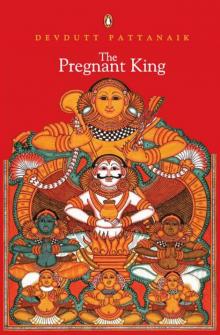 Pregnant King
Pregnant King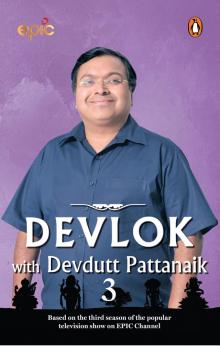 Devlok With Devdutt Pattanaik: 3
Devlok With Devdutt Pattanaik: 3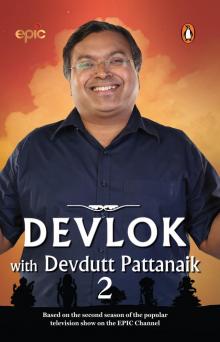 Devlok With Devdutt Pattanaik
Devlok With Devdutt Pattanaik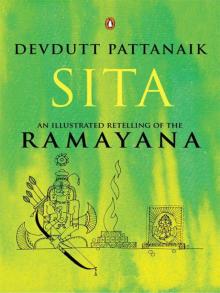 Sita: An Illustrated Retelling of the Ramayana
Sita: An Illustrated Retelling of the Ramayana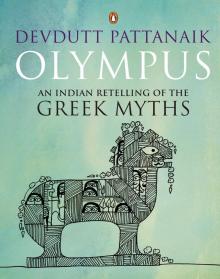 Olympus
Olympus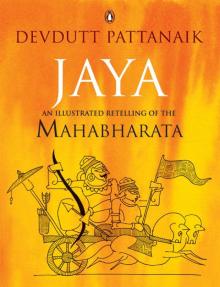 Jaya: An Illustrated Retelling of the Mahabharata
Jaya: An Illustrated Retelling of the Mahabharata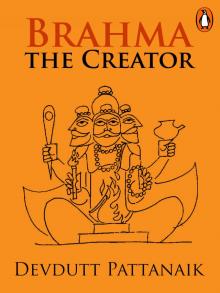 Brahma
Brahma